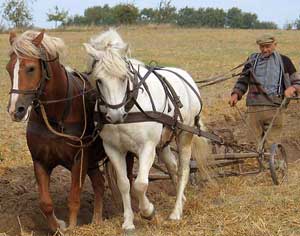 I read these items in the morning newspaper:
I read these items in the morning newspaper:
A woman testified that she had been tortured by members of Saddam Hussein’s regime, because they considered her an enemy of the state;
A young mother is suspected of murdering her 3-month-old son by putting him inside a running clothes dryer;
A couple has been charged with keeping several adopted children in chicken-wire cages;
Defenseless female refugees are still being attacked and raped by gangs of Arab men, the Janjaweed, in Darfur, Sudan, despite worldwide condemnation, much finger-wagging, and the use of the word “genocide” by the US state department.
How do we put a stop to evil?
Evil is not impeded by geographical barriers. It does not respect political jurisdictions. It is not persuaded by programs of cultural enlightenment. It does not grow weary with the passage of time.
Evil seems deaf to lofty ideals, impassioned oratory and rationalism.
But for all its bravado, evil is never as strong as it seems. It can be bound and gagged by the unrelenting application of justice. It can be rooted out by men and women who are committed to tilling the soil and planting goodness and peace in its place.
Jesus himself, in the Beatitudes, challenged us to be farmers of justice and peace:
God blesses those who are hungry and thirsty for justice, for they will receive it in full. … God blesses those who work for peace, for they will be called the children of God. —Matthew 5:6,9, NLT
The Greek here is quite vivid. Jesus speaks of “craving” or “being famished” for justice. He speaks of “laboring” or “toiling” for peace.
Evil is never challenged easily. It requires dedicated effort, sweat, persistence, unflagging attention, all driven by a growling inner hunger that is not satisfied by anything less than seeing evil vanquished and justice victorious.
Dr. Martin Luther King, Jr. came face to face with evil more than once. A son of the American apartheid, Dr. King saw clearly that evil is sometimes perpetuated by the careless indifference of good people. He said:
He who passively accepts evil is as much involved in it as he who helps perpetrate it. —Dr. Martin Luther King, Jr.
The US has fought the war in Iraq to overturn an evil regime. Saddam Hussein is responsible for tens of thousands of deaths, the attempted genocide of the Kurds, horrific acts of torture and terror against neighboring states.
In the Sudan, there may well be even more death and suffering than we’ve seen in Iraq. But because the violence is relatively confined, and the weapons of choice are not chemical bombs and long-range missiles, the world has responded tepidly.
The Janjaweed will not end their terrorism unless we do more. Much more.
Express your concerns to your Congressman or Member of Parliament. Urge your President or Prime Minister to take stronger actions. And pray for justice and peace in the Sudan.
Throughout history it has been the inaction of those who could have acted, the indifference of those who should have known better, the silence of the voice of justice when it mattered most, that has made it possible for evil to triumph. —Haile Selassie, Emporer of Ethiopia
(Photo credit: Wikipedia)




Charlie, deeply appreciate your thoughts. I agree that evil is best fought with the hard work of justice and peacemaking. I will, then, quibble with one point of yours regarding the war in Iraq (at the risk of the can of worms). I tend to think the US did not exhaust all alternatives in regards to international justice and international pressure. Is it trying to correct evil with evil, using violence for “peace”? I found King’s speech on why he opposed the Vietnam war helpful (link here) especially his quote: “We are called to speak for the weak, for the voiceless, for the victims of our nation, for those it calls ‘enemy,’ for no document from human hands can make these humans any less our brothers.” And remembering Jesus’ command to love our enemies, the cost of war on the Iraqi citizens, and the cost of war that oppresses the poor in our country. Evil is never challenged easily, as you said, but should our response endanger our own souls?
Charlie:
Evil and how to deal with it is going to be the topic of my message this weekend, which I plan to write tomorrow morning. May I have your permission to quote from this piece?
Blessings in Christ,
Mark
The story about the children in cages was probably here in northern OHio. There were eleven children. If I remember correctly, the couple was Caucasian, but none of the children were. They were all adopted, from various agencies that had not done their homework. It was a terrible situation. I think most, if not all, of the children had disabilities.
Hi Charlie –
Thank you for this piece. I’m reminded of the saying that all evil needs to prosper is for good men to do nothing.
Re: Loving your enemies. It is not loving to enable your enemies to keep on with their destructive behavior. Is it loving to allow murderers to continue destroying lives and not hold them accountable? Saddam Hussein and his crew had ample opportunity to mend their ways. There comes a time when justice must prevail.
Blessings,
Anna
Charlie thankyou for reminding us of Darfur – and for reminding us that evil is not a word just for the movies – it is going on in the real world.
Thanks for the thoughts. I found you through Spotlight on Darfur.